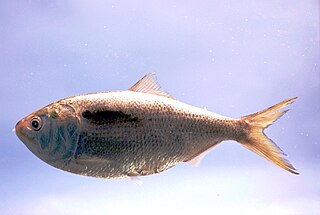
Menhaden, also known as mossbunker and bunker and "the most important fish in the sea", are forage fish of the genera Brevoortia and Ethmidium, two genera of marine fish in the order Clupeiformes. Menhaden is a blend of poghaden and an Algonquian word akin to Narragansett munnawhatteaûg, derived from munnohquohteau, referring to their use of the fish as fertilizer. It is generally thought that Pilgrims were advised by Tisquantum to plant menhaden with their crops.
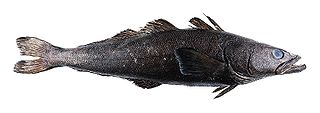
The Patagonian toothfish, also known as Chilean sea bass, mero, icefish, and Antarctic cod, is a species of notothen found in cold waters between depths of 45 and 3,850 m in the southern Atlantic, Pacific, and Indian Oceans and Southern Ocean on seamounts and continental shelves around most Subantarctic islands.
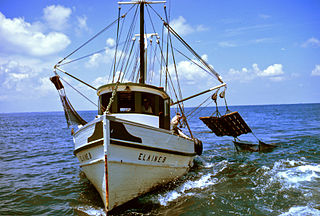
The fishing industry includes any industry or activity that takes, cultures, processes, preserves, stores, transports, markets or sells fish or fish products. It is defined by the Food and Agriculture Organization as including recreational, subsistence and commercial fishing, as well as the related harvesting, processing, and marketing sectors. The commercial activity is aimed at the delivery of fish and other seafood products for human consumption or as input factors in other industrial processes. The livelihood of over 500 million people in developing countries depends directly or indirectly on fisheries and aquaculture.
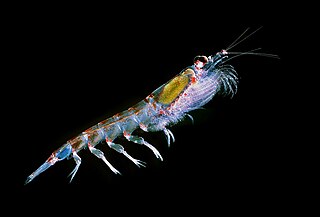
The krill fishery is the commercial fishery of krill, small shrimp-like marine animals that live in the oceans world-wide. The present estimate for the biomass of Antarctic krill is 379 million tonnes. The total global harvest of krill from all fisheries amounts to 150–200,000 tonnes annually, mainly Antarctic krill and North Pacific krill.

The Atlantic menhaden is a North American species of fish in the herring family, Alosidae.
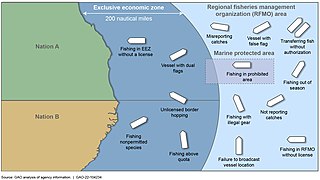
Illegal, unreported and unregulated fishing (IUU) is an issue around the world. Fishing industry observers believe IUU occurs in most fisheries, and accounts for up to 30% of total catches in some important fisheries.

Reedville is an unincorporated community in Northumberland County in the Northern Neck region of the U.S. state of Virginia. It is located at the eastern terminus of U.S. Route 360 east of Heathsville, at the head of Cockrell's Creek on the western shore of the Chesapeake Bay.
Sustainable seafood is seafood that is caught or farmed in ways that consider the long-term vitality of harvested species and the well-being of the oceans, as well as the livelihoods of fisheries-dependent communities. It was first promoted through the sustainable seafood movement which began in the 1990s. This operation highlights overfishing and environmentally destructive fishing methods. Through a number of initiatives, the movement has increased awareness and raised concerns over the way our seafood is obtained.

Canada's fishing industry is a key contributor to the success of the Canadian economy. In 2018, Canada's fishing industry was worth $36.1 billion in fish and seafood products and employed approximately 300,000 people. Aquaculture, which is the farming of fish, shellfish, and aquatic plants in fresh or salt water, is the fastest growing food production activity in the world and a growing sector in Canada. In 2015, aquaculture generated over $1 billion in GDP and close to $3 billion in total economic activity. The Department Of Fisheries and Oceans (DFO) oversees the management of Canada's aquatic resources and works with fishermen across the country to ensure the sustainability of Canada's oceans and in-land fisheries.
This page is a list of fishing topics.

The Gulf menhaden is a small marine filter-feeding fish belonging to the family Alosidae. The range of Gulf menhaden encompasses the entirety of the Gulf of Mexico nearshore waters, with the exception of the extreme eastern Yucatan and western Cuba. Evidence from morphology and DNA analyses suggest that the Gulf menhaden is the Gulf of Mexico complement to the Atlantic menhaden. Both species support large commercial reduction fisheries, with Gulf menhaden supporting the second largest fishery, by weight, in the United States.
Aker BioMarine is a Norwegian fishing and biotech company providing krill products through a fully documented and secured catch and process chain. Based in Oslo, Aker BioMarine is part of the Aker Group and the company also created Eco-Harvesting.

China has one-fifth of the world's population and accounts for one-third of the world's reported fish production as well as two-thirds of the world's reported aquaculture production. It is also a major importer of seafood and the country's seafood market is estimated to grow to a market size worth US$53.5 Billion by 2027.

As with other countries, the 200 nautical miles (370 km) exclusive economic zone (EEZ) off the coast of the United States gives its fishing industry special fishing rights. It covers 11.4 million square kilometres, which is the second largest zone in the world, exceeding the land area of the United States.

The coastline of the Russian Federation is the fourth longest in the world after the coastlines of Canada, Greenland, and Indonesia. The Russian fishing industry has an exclusive economic zone (EEZ) of 7.6 million km2 including access to twelve seas in three oceans, together with the landlocked Caspian Sea and more than two million rivers.
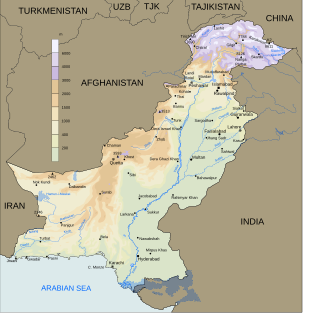
The fishing industry plays a significant part in the national economy of Pakistan. With a coastline of about 1,120 km, Pakistan has enough fishery resources that remain to be developed. Most of the population of the coastal areas of Sindh and Balochistan depends on fisheries for livelihood. It is also a major source of export earning.
A fish company is a company which specializes in the processing of fish products. Fish that are processed by a fish company include cod, hake, haddock, tuna, herring, mackerel, salmon and pollock.
The following outline is provided as an overview of and topical guide to fisheries:

The fishing industry in Denmark operates around the coastline, from western Jutland to Bornholm. While the overall contribution of the fisheries sector to the country's economy is only about 0.5 percent, Denmark is ranked fifth in the world in exports of fish and fish products. Approximately 20,000 Danish people are employed in fishing, aquaculture, and related industries.
The fishing industry in Thailand, in accordance with usage by The World Bank, the UN's Food and Agriculture Organization (FAO) and other multinational bodies, refers to and encompasses recreational fishing, aquaculture, and wild fisheries both onshore and offshore.














